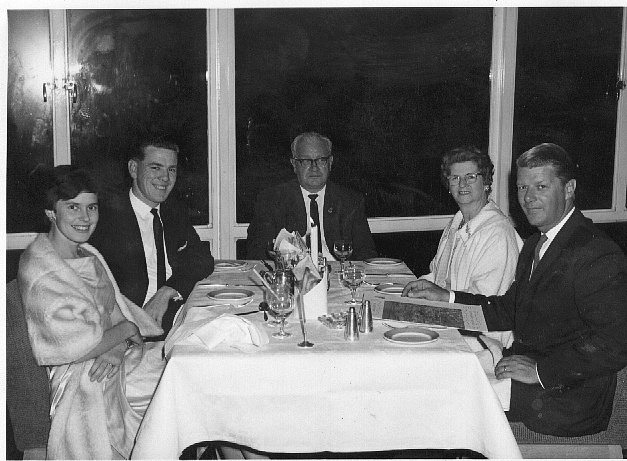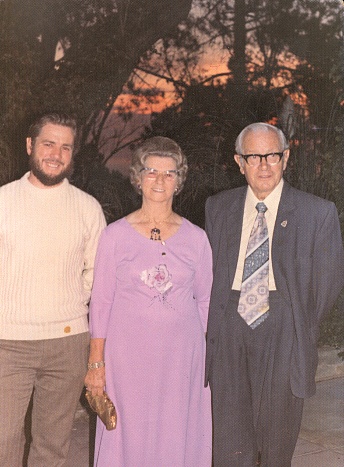6.
THE CANADIAN
CONNECTION: 1959—66
In
1959, Olive and Norman made their big overseas trip.
Olive tells the story that she and Norman had decided to have a
competition to see who could save the most from their wages for their
overseas trip. Olive was by this time working full time at a florist
in the city. Needless to say, she completely eclipsed Norman's
effort, a further reminder of her ability to be frugal, and my
father's tendency still to pick up the tab! Adelaide Joinery Works
were generous employers, giving Norman paid holidays well beyond what
was legally required of them, and funding his attendance at a lumber
conference in Chicago. In the photographs — one on the chairlift on
Grouse Mountain and one on the Queen Mary from New York to London —
they look relaxed, happy and like they are having a bloody good time!

Norman
and Olive on the Grouse Mountain chairlift
, Vancouver
1959
In
the space of time between leaving and returning to Adelaide, they had
gained two more granddaughters — Sue and Chalien, to add to Burk and
Stacey. Charmian and I remain very grateful to my parents for their
generosity to us in the first years of our marriage. I had just
finished University and begun work, and between us Charmian and I had
nothing put by. Olive and Norman had sold their house (by this time
Richmond Rd, Westbourne Park), and left us to 'mind' some of their
furniture while they were away, saving us from having to outlay money
we didn't have on furniture of our own. Their wedding present to us
was the most practical piece of furniture for newlyweds — a double
bed and mattress!

Olive
and Norman on the Queen Mary from New York to London, 1959
In
1960, Norman's father died, aged 89. Self—involved with a family of
my own, I took little notice of the impact this had on him. Although I
judge us to have been a happy family, we did not share feelings,
especially not sad feelings, very much. This was very apparent in
1964, when Bob came to visit. Trish had let my parents know that their
marriage was in trouble, but asked them not to speak of it unless Bob
introduced the subject. In the fashion of our family, nothing was said
throughout the visit. In a photo taken at the Hotel Australia, we are
all smiling for the camera except Norman, who is looking sideways at
Bob. I wonder what was in his thoughts?

Charmian,
Neil, Norman, Olive and Bob at the Hotel Australia 18 July 1964
Through
the 1960s, Norman continued to work at Adelaide Joinery, and resisted
suggestions that he might retire. He and Olive (still with Chrissie in
tow) had moved several times and were now living in a small unit at
Toorak Gardens. In the late 1960s, Norman developed
non-insulin-dependent diabetes, and its common companion,
hypertension.
Bob
had returned to Australia and was entering a difficult phase of his
life. I know that my parents agonised over this, but it seemed to take
more of a toll of my father. He was looking aged. I probably didn't
help. This was the time of the Vietnam war protests and I took up a
position in opposition to the war, which included participation in the
peace marches and writing letters to the editor. Little was said
directly about my stance, but I learned through Mum that he was
disappointed at my stance. For Norman, whose brother and uncles had
fought in WW1 and who had himself fought in WW2, this seemed like a
betrayal and a lack of patriotism. He had always been a conservative
voter and now his younger son was sporting stickers on his car
advocating support for the Opposition party! However, there were no
direct confrontations, no raised voices, just oblique references and
quiet messages on the side from my mother.
Despite
our different political stances, I never sensed disapproval. The
overwhelming memory I have of my father is of his unfailing interest
and support. Even when my brother was at his lowest and things at
their most difficult, my parents never flinched from providing
practical support and, if there was disapproval, it was seldom shown.
Even though they clearly did not like Bob's second wife, they
nevertheless did their best to swallow their disapproval and act
civilly to her.
7.
LAST YEARS: 1967 — 1974.

Neil, Olive and Norman, Belair 1973
By
1973, Norman was obviously unwell and was unwilling to travel far from
Adelaide. He still delighted in his grandchildren and he and Olive
often cared for our children while we had time out. He had cut his
working hours down to two days a week, and in June 1974 he finally
retired. A few days later he was admitted to Daws Rd Hospital with
congestive heart failure and prostatic cancer. He was hospitalised for
nearly four months and died in October 1974. In the funeral notice,
Bob and I wrote that we remembered his 'warm and generous life',
and these words still stay with me as I think of him.
He
was committed to the welfare of his family and, no matter what my
brother or I may have got up to, he was resolutely there for us. If
criticism or punishment was deserved, it was meted out with
gentleness. In an era when it was acceptable, in fact probably
expected, to smack children for misdemeanours, my father never struck
me.
He
was not a religious person, but was tolerant of those who were —
although appropriately sceptical of those who were too fanatical. He
was a life—long Freemason, as his father had been before him, and he
took responsible positions in the Freemasons' Lodge. At his funeral,
tributes were received from both the Lodge and baseball fraternities.
He had a gently paternalistic attitude to people of colour, holding
that the fact that white folk ran the world indicated of their
superiority! He felt that indigenous Australians should be left to
their own devices on their tribal lands — an untenable position
today! He was well—respected at work as a fair and firm manager, and
in social settings he was gregarious and well-liked. He enjoyed his
beer but I seldom saw him the worse for drink. However, his beer
consumption undoubtedly contributed to his weight and the later NIDD.
I
remember him in the post—war years as full of energy and fun. He was
warm-hearted, hospitable and generous with time and money. He relied
on my mother to manage money, as he was too generous with it. The
story of their meeting says it all!
I
am sorry that, as a child, I didn't give him as much time as he was
willing to give me, but I honour him as my father and take from him
some important lessons of living:
Ø
Give
of your best
Ø
Have
confidence in your own abilities, but don't think yourself better
than others
Ø
Play
the game fairly without complaint or excuse
Ø
Lose
and win with equal grace
Ø
In
achieving a balance between generosity and frugality, err on the side
of generosity!
Ø
Be
there for your children, but don't intrude on their adult lives.
Neil Quintrell
Hawthorndene
South Australia
April
2002.
